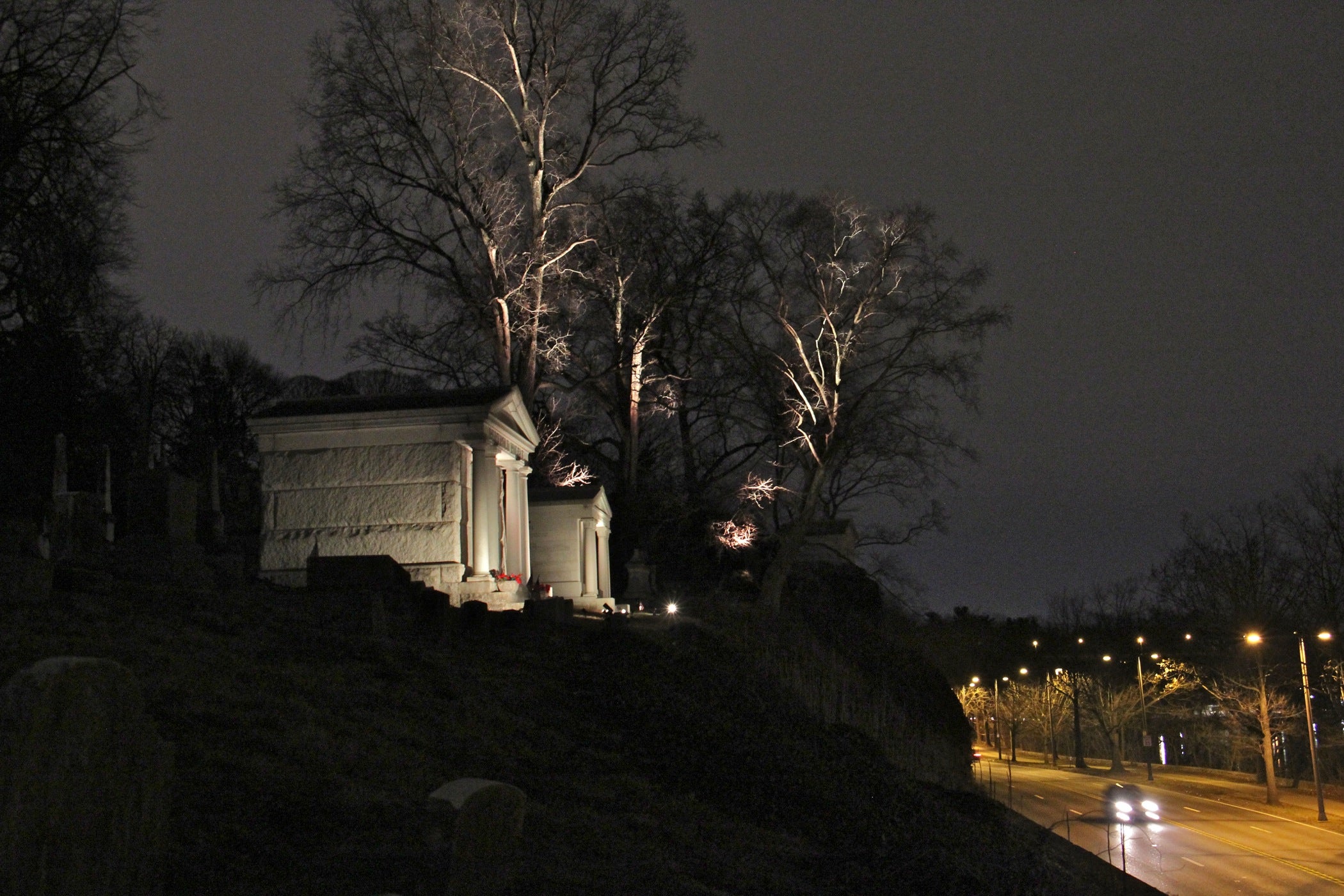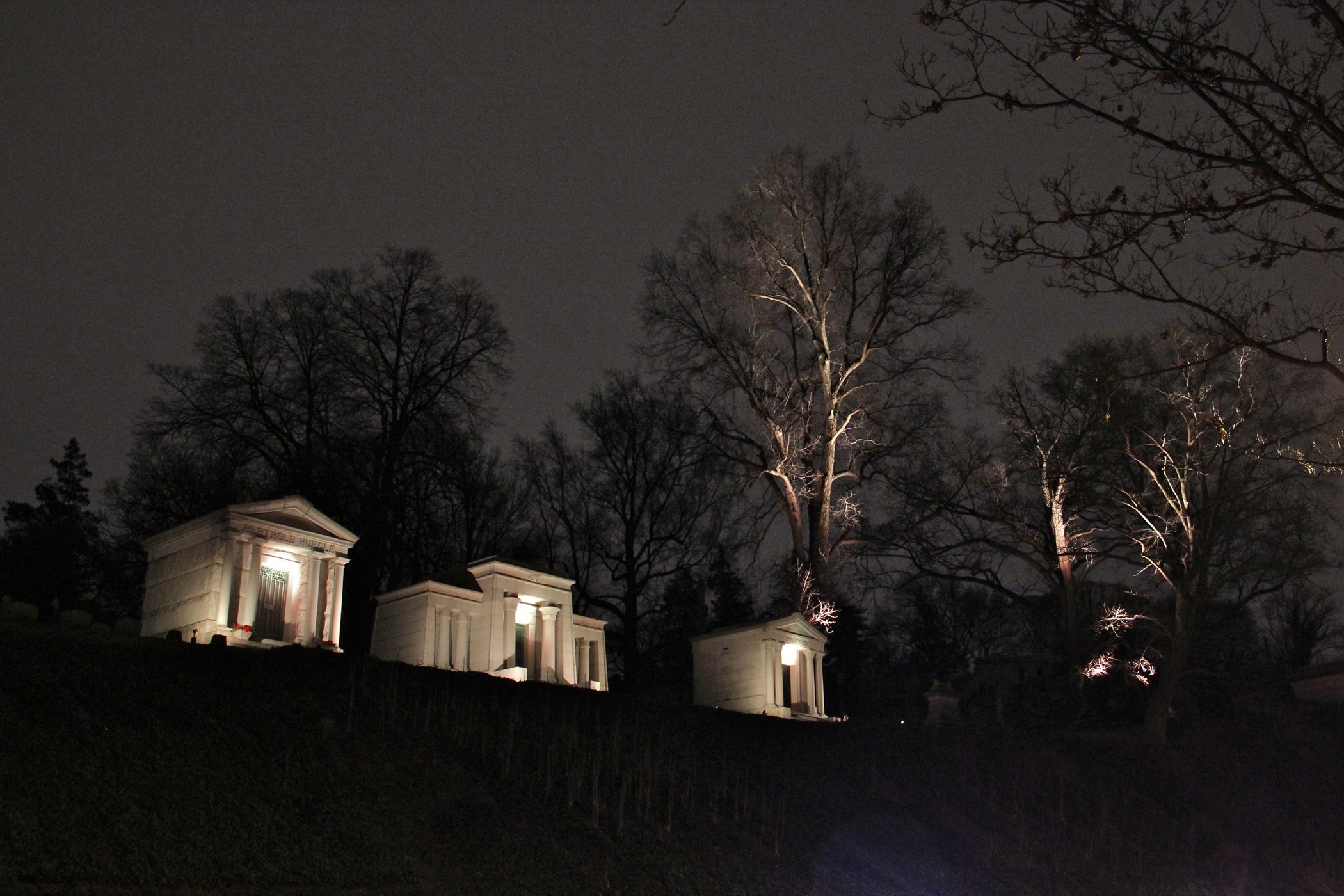Lighting up the dead: Historic Laurel Hill takes on a new glow
The 184 year-old Laurel Hill Cemetery in Philadelphia is the first to install permanent architectural lighting for its grand mausoleums.
Listen 1:47
A new project highlights the architecture and landscape of Laurel Hill Cemetery with nightly illumination. (Emma Lee/WHYY)
More than 30,000 cars zip by on Kelly Drive alongside the Schuylkill River every day, according to Nancy Goldenberg, president and CEO of the Laurel Hill Cemetery, which overlooks the riverbank. Most of those drivers likely have no idea what is over the crest of the ridge above them.
Goldenberg would like some of them, however briefly, to look up.
“Cemeteries are much more than cemeteries,” she said. “They have stories to tell, and beautiful trees. We hope that by lighting the cemetery more people will see us for the first time, even though they drive by every day.”

The Laurel Hill Cemetery just completed the first of a three-phase project to illuminate its historic grounds. Selected mausoleums and their accompanying trees perched above the intersection of Kelly Dr. and Hunting Park Ave. will be spotlighted with a gentle, warm glow after dark, from dusk to 1 a.m.
The most conspicuous mausoleum is the one holding the body of Henry Disston, the founder of the historic, 19th century saw works in Tacony. His is the largest mausoleum of the cemetery’s 78 acres.
Also illuminated are the memorials for theater entrepreneur J. Fred Zimmerman, sugar industrialist William W. Harrison, wine merchant Carl Lauber, and pioneering orthopedic surgeon Howard Steel, among others.
But the individuals are not the attraction. Goldenberg would rather passersby notice the architecture and the landscaping, rather than the names.
“It’s really the topography, the views, the location, and the context — the trees,” said Goldenberg. “We are a certified arboretum. We have beautiful trees. In fact there are four state champion trees in our cemetery.”

Laurel Hill is the first cemetery to be designated as a national historic landmark, and, as far as Goldenberg knows, the only one to be installed with permanent architectural lighting.
With a $600,000 budget, the cemetery hired Alfred Borden of The Lighting Practice to design the lighting scheme, involving 93 in-ground LED’s networked via a computerized control system.
“We tried to color warm, not unlike candlelight, and a soft focus to give it a respectful glow and draw attention in ways that are interesting to look at,” said Borden.

Established in 1836, Laurel Hill Cemetery has never been illuminated. Even it’s sign on the embankment at Kelly and Hunting Park has not been visible at night. After dark, the acreage had acted as a big, black hole in the middle of a procession of city lights.
“City Hall is lit, the beautiful buildings along Logan Square are lit, the Art Museum, Boathouse Row, the [Kelly Drive] sculptures are lit, the bridges are lit,” said Goldenberg. “Here is this is the first national historic landmark cemetery in the country, standing on this beautiful hillside like the Acropolis, and we’re not lit.”

The next phases of lighting will go up near the cemetery gatehouse on Ridge Avenue and along the northern edge of the property. A third phase will illuminate nighttime vistas across the interior. Those plans are contingent upon fundraising another millions dollars, at least, according to Goldenberg.
WHYY is your source for fact-based, in-depth journalism and information. As a nonprofit organization, we rely on financial support from readers like you. Please give today.





